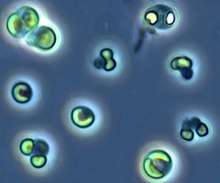Picocystis
Picocystis is a monotypic genus of green algae, the sole species is Picocystis salinarum.[1] It is placed within its own class, Picocystophyceae in the division Chlorophyta.[2]
| Picocystis | |
|---|---|
 | |
| Picocystis salinarum | |
| Scientific classification | |
| Phylum: | Chlorophyta |
| Class: | Picocystophyceae Eikrem & Lopes dos Santos |
| Order: | Picocystales Eikrem & Lopes dos Santos |
| Family: | Picocystaceae Eikrem & Lopes dos Santos |
| Genus: | Picocystis R.A.Lewin 2001 emend. Eikrem & Lopes dos Santos 2017 |
| Species: | P. salinarum |
| Binomial name | |
| Picocystis salinarum R.A.Lewin 2001 | |
Structure
Picocystis salinarum cells under normal conditions have a spherical or oval shape. Their size ranges from 2 to 3μm (micrometer, 10^-6) in diameter. Under conditions of nutrient depletion they appear to form a trillobe shape. The general appearance resembles to that of a standard green algae.
The pigments are composed mainly from chlorophyll a and b and the carotenoids violaxanthin, alloxanthin, monadoxanthin, neoxanthin, lutein, diatoxanthin and zeaxanthin.[3][4]
The cell wall is mainly composed of polymers of the monosaccharide arabinose, polyarabinose.[3]
Habitat
The species have been found in saline or hypersaline alkaline environments. [5][6]

References
- Guiry, M.D.; Guiry, G.M. (2008). "Picocystis". AlgaeBase. World-wide electronic publication, National University of Ireland, Galway.
- Lopes Dos Santos A, Pollina T, Gourvil P, Corre E, Marie D, Garrido JL, Rodríguez F, Noël MH, Vaulot D, Eikrem W (October 2017). "Chloropicophyceae, a new class of picophytoplanktonic prasinophytes". Scientific Reports. 7 (1): 14019. Bibcode:2017NatSR...714019L. doi:10.1038/s41598-017-12412-5. PMC 5656628. PMID 29070840.
- Lewin RA, Krienitz L, Goericke R, Takeda H, Hepperle D (2000). "Picocystis salinarum gen. et sp nov (Chlorophyta) - a new picoplanktonic green alga". Phycologia. 39: 560–565. doi:10.2216/i0031-8884-39-6-560.1.
- Lopes Dos Santos A, Gourvil P, Rodríguez F, Garrido JL, Vaulot D (February 2016). "Photosynthetic pigments of oceanic Chlorophyta belonging to prasinophytes clade VII". Journal of Phycology. 52 (1): 148–55. doi:10.1111/jpy.12376. hdl:10261/129034. PMID 26987097.
- Krienitz L, Bock C, Kotut K, Luo W (January 2012). "Picocystis salinarum (Chlorophyta) in saline lakes and hot springs of East Africa". Phycologia. 51 (1): 22–32. doi:10.2216/11-28.1.
- Stamps BW, Nunn HS, Petryshyn VA, Oremland RS, Miller LG, Rosen MR, et al. (November 2018). "Metabolic Capability and Phylogenetic Diversity of Mono Lake during a Bloom of the Eukaryotic Phototroph Picocystis sp. Strain ML". Applied and Environmental Microbiology. 84 (21). doi:10.1128/AEM.01171-18. PMC 6193381. PMID 30120120.